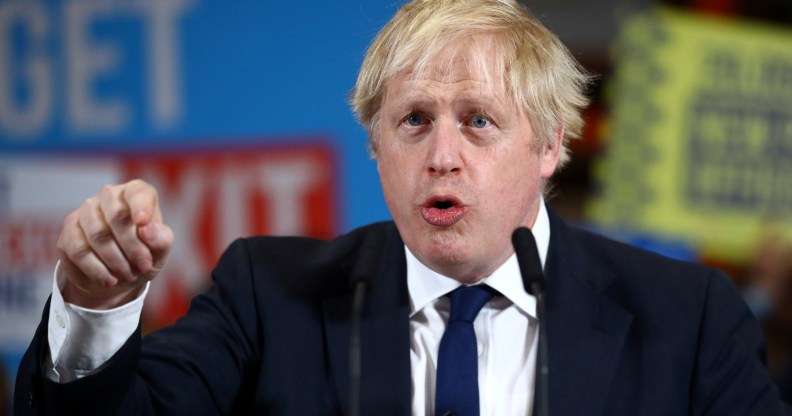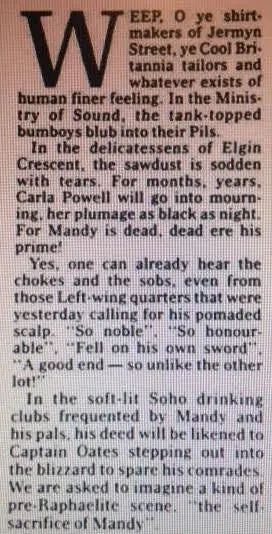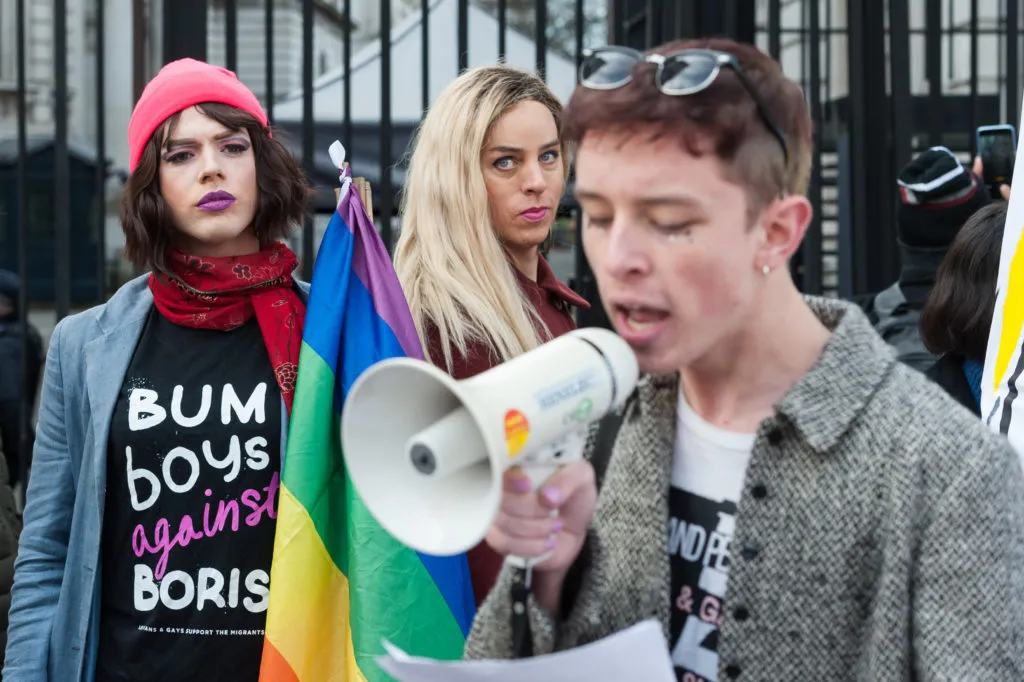A comprehensive guide to Boris Johnson’s infamous use of ‘tank-topped bum boys’

Boris Johnson. (Getty)
Boris Johnson has, time and again, refused to apologise for using homophobic slurs such as “tank-topped bum boys”.
Johnson’s history of making homophobic remarks is under the microscope once more after Labour deputy leader Angela Rayner called the prime minister “scum”.
Asked if she would retract her words, she told the BBC Sunday (26 September) that Johnson was a “racist, homophobic misogynist”.
“I will apologise when Boris apologises for saying the comments he has made, I will retract that he is scum.”
Speaking during a BBC Question Time leaders’ special three weeks before the 2019 general election, Johnson suggested that any offence around his past comments was manufactured.
“If you go through all my articles with a fine-tooth comb and take out individual phrases, there is no doubt that you can find things that can be made to seem offensive and of course I understand that.”
So we thought we’d do just that, in an attempt to end the debate on whether or not his words were offensive once and for all.
‘Tank-topped bum boys.’
The “bum boy” quote dates back to a 1998 Telegraph column about the gay MP Peter Mandelson’s resignation from the New Labour cabinet.
Here it is, in full, in its original context.
“Weep, O ye shirt-makers of Jermyn Street, ye Cool Brittania tailors and whatever exists of human finer feeling,” Johnson wrote.
“In the Ministry of Sound, the tank-topped bum boys blub into their Pils.

Boris Johnson’s Telegraph column, in which he writes about ‘tank-topped bum boys.’ (Telegraph/Business Insider)
The rest of the column is more of the same (minus the slurs), mocking the left’s reaction to Mandelson’s political demise, especially that in the “soft-lit Soho drinking clubs frequented by Mandy and his pals”.
Aside from the fact that no self-respecting “bum boy” would be caught dead drinking Pils in the Ministry of Sound, the slur is a clear, derogatory reference to Mandelson’s sexuality.
The Labour MP had been outed as gay on the BBC’s Newsnight just weeks before the column was published, though tabloids had alluded to his sexuality prior to that by giving him the feminine nickname ‘Mandy’.
Attacking Labour’s opposition to Section 28 and criticising same-sex marriage.
In 2000 Johnson wrote a column for The Spectator – where he was, by then, editor – attacking Labour for its opposition to Section 28.
The article began by criticising then-prime minister Tony Blair for appointing Lord Grenfell a life peer, “to rescue him from the general cull of the hereditary peers”.
Johnson was aghast that Grenfell lived and presumably paid taxes in Paris.
This British legislator is voting in favour of Labour’s appalling agenda, encouraging the teaching of homosexuality in schools, and all the rest of it, while his taxes are going on the Paris Metro and the SNCF. Where are the shrieks of protest?
A year later, in 2001, Johnson released his first book, Friends, Voters, Countrymen, which recounted his successful campaign for the parliamentary seat of Henley.
In it, he wrote: “If gay marriage was OK – and I was uncertain on the issue – then I saw no reason in principle why a union should not be consecrated between three men, as well as two men, or indeed three men and a dog.”
Boris Johnson changes tune on ‘bum boys’ – for the most part.
As an MP, Johnson went on to vote for the abolition of Section 28 in 2003 – defying the Conservative party whip, and for same-sex civil partnerships in 2004.
As Mayor of London he adopted an even more liberal persona, and in 2010 came out in support out of marriage equality in a PinkNews interview.
As mayor he also took part in several Pride events, including one in 2013 in which he made a homophobic joke about gay men getting married at the ArcelorMittal Orbit scultpture in Stratford, East London.
“It will be the perfect ceremony, you can take your partner up the… [Arcelor]. I think I can get away with that,” he said.
Boris Johnson’s failure to apologise for ‘bum boys’.
As well as his Johnson’s use of homophobic slurs, he has also been challenged on derogatory comments about women – especially Muslim women, single mothers, the working class and black people.
A lengthy list of offensive remarks were unearthed by Business Insider in January 2018, when Johnson was foreign secretary.
The following June, during the Conservative leadership challenge that he eventually won, he said that his reference to black people having “watermelon smiles” was “wholly satirical” and suggested his other comments had been “wretched out of context”.

Members of LGBTQ community protest outside Downing Street (Wiktor Szymanowicz/NurPhoto via Getty Images)
Around the same time, he was asked about the “bum boy” slur during a head-to-head debate with Tory leadership also-ran Jeremy Hunt.
He replied: “If you are going to excavate and disinter every single quotation from the millions of words I have (written), you can of course twist things one way or the other.”
Upon becoming prime minister, Johnson was asked by the LGBT+ Conservatives group to issue an apology for his previous remarks. As of yet, no apology has been forthcoming.
Party leaders attack Boris Johnson over ‘bum boys’ remarks.
During the 2019 general election campaign, opposition party leaders used Johnson’s past comments as evidence of his unsuitability for office.
When PinkNews asked the Liberal Democrat’s Jo Swinson if anyone who uses language like “tank-topped bum boys” is fit to lead the UK, she replied: “God no. Does anyone?”
Green Party leader Sian Berry told PinkNews: “There are hundreds of reasons why Boris Johnson isn’t fit to lead the country, but the casual racist, sexist, homophobic slurs dished out in his newspaper columns should have struck him out of politics forever.
“The fact that he was ever London mayor, let alone the prime minister, is alarming to me and shows how far our country still has to go in the fight against prejudice.”
Adam Price, leader of Plaid Cymru and the first openly gay man to lead a major UK party, said that it was a “sad reality” that Johnson “referred to gay men like myself as ‘bum boys in tank tops'” and “to Muslim women as looking like ‘letterboxes’,” during an ITV election debate.
This is actually creating the climate where abuse becomes acceptable whether it’s abuse of women or minorities and that’s why neither Trump nor Boris Johnson are fit to be in public life.
The only leader to defend Johnson was Nigel Farage, who said that such terms are simply part of the Boris brand.
“Boris is a guy who has earned his living being a very outspoken journalist and that’s why he uses phrases like that,” he told LBC.
“He talks about letterboxes, other things… It’s not very pretty, but that’s Boris.”
This article was originally published in 2019. In the almost two years since, Johnson has still not apologised for his remarks.

